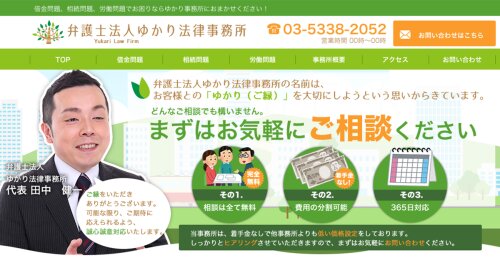Best Employment Benefits & Executive Compensation Lawyers in Tokyo
Share your needs with us, get contacted by law firms.
Free. Takes 2 min.
List of the best lawyers in Tokyo, Japan
About Employment Benefits & Executive Compensation Law in Tokyo, Japan
Employment Benefits & Executive Compensation law in Tokyo, Japan, is an integral part of employment law, focusing on the legal regulations and practices related to employee benefits, pensions, executive compensation, and incentive plans. The legal framework in Japan ensures fair compensation and benefits to enhance the welfare of employees. It addresses issues like retirement plans, health benefits, severance packages, stock options, and compliance with labor standards. As Tokyo is a major business hub, understanding these laws is vital for both employers and employees to ensure compliance and equitable economic relationships.
Why You May Need a Lawyer
There are several situations where individuals or companies may require legal assistance in the field of Employment Benefits & Executive Compensation. These include:
- Negotiating complex executive compensation packages or benefits.
- Ensuring compliance with local labor laws and avoiding penalties.
- Handling disputes related to employee benefits or compensation claims.
- Assisting in mergers and acquisitions that involve restructuring employee benefits.
- Drafting and reviewing employment contracts, particularly for expats or foreign entities.
- Addressing pension or retirement plan issues and disputes.
Local Laws Overview
Tokyo operates under Japanese law, which has specific statutes governing employment benefits and compensation. Important aspects include:
- Labor Standards Act: This outlines basic employment terms, working conditions, and standards for wages and working hours.
- Health Insurance and Pension schemes: Regulations cover mandatory insurances that employers must provide.
- Retirement Benefits Regulations: Laws ensure that retirement contributions are handled correctly for all employees.
- Discrimination and Equal Opportunity Laws: These laws ensure that employers provide equal benefits and compensation, regardless of gender or any other protected characteristic.
- Executive Compensation Disclosure: Companies are required to disclose compensation for executives, ensuring greater transparency.
Frequently Asked Questions
1. What is included in typical employment benefits in Tokyo?
Typically, employees receive health insurance, pension contributions, allowances for housing or transportation, annual leave, and bonuses.
2. Are foreign companies subject to Japanese employment benefits laws?
Yes, foreign companies operating in Japan must comply with Japanese labor laws, including employment benefits and compensation standards.
3. How are executive compensation agreements typically structured?
Executive compensation may include a combination of salary, bonuses, stock options, and other benefits determined by contracts and corporate policies.
4. What rights do employees have regarding retirement benefits?
Employees are entitled to pensions and retirement benefits as per the Japanese pension system, which requires contributions from both employers and employees.
5. How can disputes over benefits be resolved?
Disputes can be resolved through negotiation, mediation, or if necessary, legal action in courts for dispute resolution.
6. Are there specific laws protecting executive compensation packages?
Yes, there are laws requiring transparency in executive compensation and ensuring that they are in line with corporate governance standards.
7. Can an employer unilaterally change the benefits offered?
No, any changes typically need to be negotiated and agreed upon, adhering to existing contracts and labor laws.
8. What role does the Social Insurance Agency play?
The Social Insurance Agency administers health insurance and pension plans, ensuring compliance with mandatory requirements.
9. How are severance pay and redundancy benefits managed?
Severance and redundancy benefits are regulated under employment contracts and local laws, often based on tenure and company policy.
10. What is the role of compliance in executive compensation?
Compliance ensures that compensation practices align with legal standards, reducing the risk of legal disputes and fostering fair employment practices.
Additional Resources
For those seeking further information or assistance, consider the following resources:
- The Ministry of Health, Labour and Welfare: Provides guidance on labor laws and standards.
- Japan Pension Service: Offers detailed information related to pensions and retirement benefits.
- Tokyo Labor Consultation Centers: Provides free advice and consultation on employment issues.
- Legal Associations in Tokyo: Can connect individuals with qualified employment law attorneys.
Next Steps
If you are seeking legal assistance in Employment Benefits & Executive Compensation in Tokyo, the following steps can help:
- Consult with a qualified attorney specializing in Japanese employment law.
- Gather all relevant documents related to your employment and benefits.
- Book a consultation to discuss your specific issues and get tailored advice.
- Consider mediation or negotiation as initial steps to resolve disputes amicably.
- Stay informed about your rights and obligations under Japanese law to ensure compliance and protect your interests.
Lawzana helps you find the best lawyers and law firms in Tokyo through a curated and pre-screened list of qualified legal professionals. Our platform offers rankings and detailed profiles of attorneys and law firms, allowing you to compare based on practice areas, including Employment Benefits & Executive Compensation, experience, and client feedback.
Each profile includes a description of the firm's areas of practice, client reviews, team members and partners, year of establishment, spoken languages, office locations, contact information, social media presence, and any published articles or resources. Most firms on our platform speak English and are experienced in both local and international legal matters.
Get a quote from top-rated law firms in Tokyo, Japan — quickly, securely, and without unnecessary hassle.
Disclaimer:
The information provided on this page is for general informational purposes only and does not constitute legal advice. While we strive to ensure the accuracy and relevance of the content, legal information may change over time, and interpretations of the law can vary. You should always consult with a qualified legal professional for advice specific to your situation.
We disclaim all liability for actions taken or not taken based on the content of this page. If you believe any information is incorrect or outdated, please contact us, and we will review and update it where appropriate.














